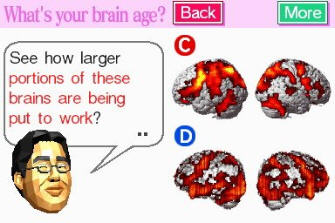
Featured Blog | This community-written post highlights the best of what the game industry has to offer. Read more like it on the Game Developer Blogs or learn how to Submit Your Own Blog Post
Alzheimer's and Video Games
Studies show that video games may delay the symptoms of Alzheimer's and other forms of dementia. Successful gamers think, focus and utilize scarce resources. My dad may have Alzheimer's, so I wrote this article for all families hoping to prevent it.


Tetris
There seems to be a lot of arguing about the value of video games in everyday life. Violence in schools always seems to bring the knee-jerk reaction about how violence in video games are affecting our youth.Researchers today, however, are becoming interested in how video games affect our seniors. Specifically, there is a fair amount of research being performed regarding whether gaming can stave off the symptoms of Alzheimer's and other forms of dementia.
Alzheimer's patients are known to exhibit diminished levels of dopamine, a neurotransmitter. Without dopamine, people aren't able to learn properly. Disturbances in dopamine levels affect behavior, feelings, appetite, and memory.
Common symptoms of Alzheimer's, a degenerative brain disease, include loss of memory, loss of ability to speak and think clearly, the loss of ability to perform activities of daily living, and visible changes in behavior.
Current research indicates that altering the levels of dopamine in the body may allieviate some of the mood and emotional imbalances associated with Alzheimer's. A number of studies have indicated that game-playing triggers the release of dopamine in the brain.
In addition to the benefits of dopamine and game-playing, it has been found that a person who stays intellectually active can reduce the risk of Alzheimer's by one-third. Studies have shown that mentally active people exhibit a lower rate of symptoms and that they may have a later onset of symptoms for dementia.
Television produces an alpha state similar to sleep and deep meditation. Keeping intellectually active and curious can help stave off the affects of Alzheimer's, studies show. Video games keep the player thinking. One of the goals of good game design is to affect the inner dialogue a player maintains while playing. It is common knowledge that gaming affects eye-hand coordination and reflexes.
Studies have now shown that video games also improve visual skills, attention span and information processing time. One study, by Shawn Green and Daphne Bavelier at the University of Rochester, found that gamers consistently out-performed non-gamers on standard tests that measured these skills.

Brain Age
In a now well-known study, neuroscientist Richard Haier, conducted research using brain scans on students playing the Tetris video game. He noted that some parts of the brain used less glucose as the players became more skilled at the game.This indicates that the brain actually works more efficiently with training. A new study, published September 1, 2009, found that Tetris players' brain functions improved in areas linked to critical thinking, reasoning, language, and information processing.
In October of 2006, the Federation of American Scientists endorsed video games as a potential means for teaching high-order thinking skills such as strategic thinking, interpretive analysis, problem-solving, plan formation and execution and adaptation to rapid change. This is the kind of thinking that those hoping to avoid Alzheimer's need to improve.
Gaming won't prevent dementia. It can't cure it. Successful gamers must focus, have patience, plan, and prioritize scarce resources. In other words, they must think. This is the goal of research into gaming and Alzheimer's. While games such as Brain Age promise to "Train Your Brain in Minutes a Day!", most games offer the benefits described above. It's not a cure, but it may be prevention.
For More Information:
Read more about:
Featured BlogsAbout the Author(s)
You May Also Like







.jpeg?width=700&auto=webp&quality=80&disable=upscale)








